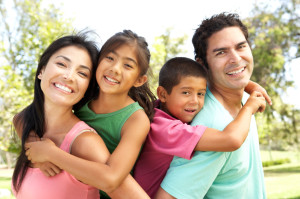- A child’s language development is an important part of their life. We have provided some basic information related to development through the acquisition of new milestones. Remember that all children develop at a different pace so your child may acquire them slightly before or after the ages listed below.
Birth – 6 Months
- Startles to loud sounds
- Seems to recognize your voice and quiets if crying
- Makes pleasure sounds (cooing, gooing)
- Smiles when they see you
- Moves eyes in direction of sounds
- Notices toys that make sounds
- Babbling sound more speech like with many sounds including “p”, “b”, and “m”
- Chuckles and Laughs
![]()
7 Months to 1 Year
- Enjoys games like peek-a-boo and pat-a-cake
- Begins to respond to requests (e.g “Come here” or “want more?”)
- Babbling has both long and short groups of sounds such as “tata upup bibibibi”
- Uses gestures to communicate (waving, holding arms up to be picked up)
- Imitates different speech sounds
- Has one or two words (hi, dog, dada, mama) around first birthday, although sounds may not be clear
![]()
2 – 3 Years
- Has a word for almost everything
- Uses “k”, “g”, “f”, “t”, “d”, and “n” sounds
- Speech is understood by familiar listeners most of the times
- Follows two-step directions (e.g “Get the book and put it on the table.”)
![]()
3 – 4 Years
- Answers simple “who?”, “what?”, “where?” and “why?” questions
- Talks about activities at school or at friends homes
- People outside of the family usually understand child’s speech
- Uses a lot of sentences that have 4 or more words
- These are a few of the developmental skills that your child should be completing at different stages of their growth. If you would like to know more about each stage, you can consult with one of our team members here at Rio Grande Therapy Group, or check out our “Parent Resources” page for additional information.


